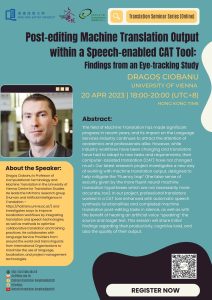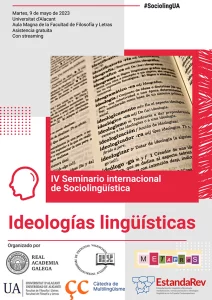II Jornada sobre la relació entre teories lingüístiques i l’ensenyament de L2/LE/LA: sinergies entre la recerca i el disseny de materials didàctics
Objectius:
- Reflexionar sobre la transferència dels coneixements de la recerca en lingüística i en didàctica de llengües en el disseny i l’elaboració de materials per a l’ensenyament de L2/LE/LA.
- Explorar les vies de col·laboració entre les disciplines i la transferència de coneixements a l’àmbit del disseny de materials.
- Crear aliances entre investigadors, docents, creadors de materials i persones interessades en l’ensenyament de llengües.
Inscripció (gratuïta però obligatòria)
Organització:
Llorenç Comajoan-Colomé, Universitat de Vic – Universitat Central de Catalunya
Ares Llop Naya, Fitzwilliam College-University of Cambridge
Anna Paradís, University of Oxford
Eloi Puig-Mayenco, King’s College London
 Queda abierta la convocatoria de la XVIII edición del Premio de Traducción Francisco Ayala. En esta ocasión, se proponen para su traducción al español textos en inglés, alemán y chino. El plazo de entrega de textos se cierra el 28 de febrero de 2023.
Queda abierta la convocatoria de la XVIII edición del Premio de Traducción Francisco Ayala. En esta ocasión, se proponen para su traducción al español textos en inglés, alemán y chino. El plazo de entrega de textos se cierra el 28 de febrero de 2023.
El certamen, coorganizado por la Fundación Francisco Ayala y la Facultad de Traducción e Interpretación de la Universidad de Granada, se dirige a estudiantes universitarios y recién egresados de cualquier universidad y nacionalidad; y pretende potenciar los aspectos creativos en el ámbito de la traducción universitaria.
Toma el nombre del escritor Francisco Ayala, que fue, además de narrador, jurista, sociólogo y profesor, traductor de obras jurídicas y literarias del alemán, francés e italiano durante las décadas de 1930 y 1940.
Once a month, the Translation Studies Reading Group of the Trinity Centre for Literary & Cultural Translation comes together to discuss an article recently published in a Translation Studies journal.
The group is free and open to anyone in the world to join in with, irrespective of academic level or affiliation. All you need to do is read the article before the group meets and sign up. Everyone is encouraged to join in with the conversation and add their own viewpoints. We are not able to send the articles to people who do not have access to them.
The details of the article we will read for this month’s Reading Group are below. Please follow the link for access to the full article.
Anthony Pym
Who says who interprets? On the possible existence of an interpreter system
If we ask who is selected to interpret in a particular setting, who is most trusted, the answers rarely concern interpreting as an independent social system. Different legal systems decide whom they trust as translators; institutional employers carry out their own exams; education systems provide signals of competence; the systems of controlled knowledge (science) and its diffusion (news) tend to rely on their own members who ‘know languages’ and, as has been seen in the case of pandemic-related information, rarely display constant trust in wholly independent interpreters. Analysis of interpreters’ trustworthiness in terms of Luhmann’s sociology can thus start from dependencies between at least four possible types of system: interpreters supply utterance; legal systems assume truthful utterance; education systems attest the relative trustworthiness of utterance; systems of knowledge control and diffusion (science, the military, government information, news) assume shared skills or ad hoc modes of professional hybridity. On this view, an interpreter system is only sometimes able to create its own signals of trustworthiness and have those signals accepted. In many instances, it must rely on intersystemic relations, which are often irritations ensuing from the way one social system is given to not understanding another.
https://www.tandfonline.com/doi/full/10.1080/13556509.2022.2083752
Qu’est-ce que l’écologie — en général et dans nos métiers ? Comment la traduction s’inscrit-elle dans l’écosystème de l’édition et de la production de contenus ? Comment adopter une démarche écologique dans son activité ? C’est entre autres à ces questions que répondra Marin Schaffner, traducteur et militant de l’écologie, lors d’une masterclass à destination des traducteurs et traductrices de tous secteurs.
Cette masterclass, organisée en partenariat avec l’université de Tours, se tiendra en mode hybride sur place à l’Université de Tours ou à distance sur la plateforme Teams.
Un enregistrement sera mis à la disposition des personnes inscrites dans les semaines qui suivront la masterclass.
Inscriptions (le tarif étudiant sur justificatif est gratuit)
JOURNEE D’ÉTUDE
LITTERATURE CATALANE CONTEMPORAINE
Écrivaines contemporaines d’expression catalane : les traduire en français et/ou en castillan
Escriptores contemporànies d’expressió catalana : traduir-les al francès i/o al castellà
ReSO (Université Paul-Valéry Montpellier 3) et GETLIHC (Universitat de Vic)
Organisatrices : Sandrine FRAYSSINHES RIBES, Caterina RIBA et Júlia ROCAS SUMOY
Speaker: Professor Dragoș Ciobanu
University of Vienna
Moderator:
Dr Nan ZHAO
Department of Translation, Interpreting and Intercultural Studies, Hong Kong Baptist University
Organizer:
Centre for Translation, Hong Kong Baptist University
Once a month, the Translation Studies Reading Group of the Trinity Centre for Literary & Cultural Translation comes together to discuss an article recently published in a Translation Studies journal.
The group is free and open to anyone in the world to join in with, irrespective of academic level or affiliation. All you need to do is read the article before the group meets and sign up. Everyone is encouraged to join in with the conversation and add their own viewpoints. We are not able to send the articles to people who do not have access to them.
The details of the article we will read for this month’s Reading Group are below. Please follow the link for access to the full article.
Pilar Ordóñez López & Rosa Agost
Future translatorsʼ views on translation theory: a qualitative approach
The practical orientation of undergraduate translation and interpreting degrees in Spain means that less importance is given to theoretical modules, and it is often thought that students doubt the usefulness of these modules and are therefore reluctant to take them. Previous empirical researchhas shown that students are not as averse to theory as is often assumed; in fact, according to these studies, students rate its contribution to their training quite positively. In order to take a further step in the study of students’ views on translation theory, the present study adds a qualitative perspective to (in)validate the results obtained in previous research and explore them in greater depth. Students’ answers to open questions are analysed using Atlas.ti qualitative analysis software to assess how translation theory contributes to their training and identify the strengths and weaknesses of the translation theory module at Jaume I University (Castellón, Spain). Our findings show that fitting translation theory into the training and education of translators is a complex task and they also reveal that cognitive restructuring is needed to help students overcome their tendency to associate theory with complex, dense, difficult-to-grasp and, ultimately, useless concepts.
El IV Seminario internacional de Sociolingüística tendrá lugar el 9 de mayo de 2023 en el Aula Magna de la Facultad de Filosofía y Letras de la Universitat d’Alacant y se retransmitirá gratuitamente por streaming desde esta dirección: https://si.ua.es/es/videostreaming/filosofia-y-letras.html
Las personas que asistan solamente en línea no podrán tener certificado de asistencia porque el programa no permite controlar la asistencia real.
En su canal de YouTube se pueden encontrar los vídeos de los seminarios anteriores:
I Seminario: https://youtube.com/playlist?list=PLsRZfy60RkwDK8Ot8miO1YqGLz2BPVFek
II Seminario: https://youtube.com/playlist?list=PLsRZfy60RkwCw6WKyPRxjVwAZ3eZmKZ7Z
III Seminario: https://www.youtube.com/watch?v=Ir1Jwg1Yt9o (por la mañana)
https://www.youtube.com/watch?v=3cQv_Qnx4X0 (por la tarde)












